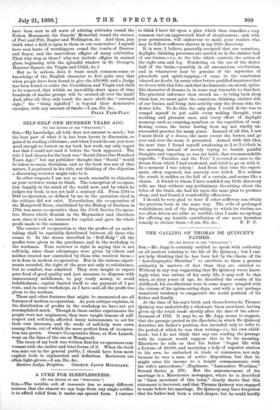SELF-HELP ONE HUNDRED YEARS AGO.
[TO THE EDITOR OF THE "SPECTATOR.']
SIR,—My knowledge, all told, does not amount to much ; but the best part of what it is has been learnt in discussion, or gained in reading criticisms ; and when I read the one you were good enough to bestow on my book last week, my only regret was that I could not read it before the book appeared. The title I had chosen for the book was " Social Ideas One Hundred Years Ago ;" but my publisher thought that " Social " would be taken to mean Socialism, and as the book was not of that nature, I acquiesced in his title, not thinking of the objection a discerning reviewer might take to it.
In other respects I am not so much amenable to objection as your reviewer seems to think. The conception of co-opera- tion happily in the mind of the world now, and by which he judges my book, is not yet half a century old. From 1794 to 1844 co-operation, as defined by me in the quotation cited in the critique, did not exist. Nevertheless, the co-operation of the Mongewell Store, established by the Bishop of Durham in 1794, was more co-operative than the Civil Service Co-opera- tive Stores which flourish in the Haymarket and elsewhere now, since it took no interest for capital, and gave the whole profit made to the consumer.
The essence of co-operation is that the profits of an under- taking shall be equitably distributed between all those who create it. In the stores described in " Self-Help " all the profits were given to the purchaser, and in the workshop to the workmen. Your reviewer is right in saying this is not self-help, since these advantages were given by others and neither created nor controlled by those who received them— as is done in modern co-operation. But in the various experi- ments recorded, the right of the poor not only to subsistence, but to comfort, was admitted. They were taught to expect pure food of good quality and just measure, to dispense with unneccessary middlemen, to pay ready money, to avoid indebtedness ; capital limited itself to one payment of 5 per cent., and in some workshops, as I have said, all the profit was given to the workers.
These and other features that might be enumerated are all features of modern co-operation. As your critique explains, in the distribution of profits in the workshop we have not yet accomplished much. Though in these earlier experiments the people were not originators, they were taught lessons of self- respect and self-help, afforded many inducements to act for their own interests, and the seeds of self-help were sown among them, out of which the more perfect form of co-opera- tion has grown. Owen's Co-operative Store, at New Lanark, went on the lines of the one at Mongewell.
The story of my book was written first for co-operators con- versant with the earlier and later forms of it. When the book was sent out to the general public, I should have been more explicit both in explanation and definition. Reviewers are often light-givers.—I am, Sir, &a., Eastern Lodge, Brighton. GEORGE JACOB HOLYOAKE.


































 Previous page
Previous page